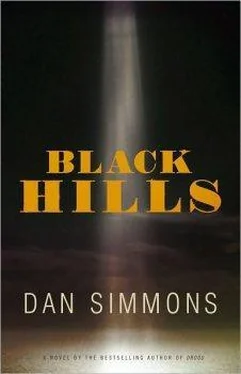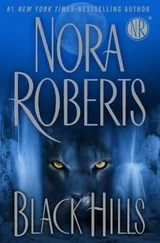— Long Hair? General? You still here?
“You can call me Colonel. What do you want now? To tell me how tumbledown the shacks and hovels are here in Crow country?”
— No. I wanted to explain to you why I didn’t push the plunger down on Mount Rushmore. But the shacks did make me think of it.
“I know why you didn’t push the plunger down on Mount Rushmore, Paha Sapa. You lost your nerve. But do you have another explanation?”
— The cemetery on Pine Ridge Reservation… the one at the Episcopal mission church and school. The cemetery where Rain and her father are buried.
The ghost says nothing. The purr and putter of the Harley-Davidson J’s rebuilt engine, working perfectly now, is the only sound in the night. It’s cool enough that Paha Sapa is wearing the long leather jacket Robert left him.
Paha Sapa considers not continuing—this ungrateful ghost does not deserve a conversation, much less an explanation—but after a while he goes on:
— Every once in a while some boys… men too, I think… on the reservation would sneak into the cemetery at night and carry out some vandalism there. Most of the crosses and headstones were made of wood, of course, so they just kicked those apart, but a few of the larger headstones—the Reverend de Plachette’s, for instance—were of stone, and the vandals took crowbars or sledgehammers to the stone, smashing it as much as they could, tipping over what they couldn’t smash.
The ghost’s voice sounds weary.
“You didn’t want to be just another cemetery vandal.”
— When I heard both Borglum and the president say that the Mount Rushmore heads would be there for a hundred thousand years, I could imagine the vandalized and broken fragments of the heads being there that long. Every culture honors its dead leaders —you’re honored at this place we’re headed. The thought of being like those vandals who come to the cemetery out of their stupidity and frustration and urge to destroy other people’s remembrances because they’re unable to create anything themselves… it felt wrong.
“Very noble, Paha Sapa. So you’ll let the Wasichu Stone Giants stand astride your sacred Paha Sapa and prairie rather than be a vandal.”
— Your Wasichu Stone Giants have already risen and done what they did to us, Long Hair. Vandalizing Borglum’s life’s work wouldn’t have changed that. Look on either side of the road.
The headlight flickered and danced, illuminating little. But visible in the cloud-filtered moonlight were more shacks with packed dirt for front yards, a huddling of shacks in lieu of a community, filth where high-grass prairie had once grown.
“I know. I came this way in my last days alive, remember? I remember this prairie glistening after morning rains. I remember the flowers stretching from horizon to horizon here, just as the buffalo herds did. You Indians were always filthy in your ways, Paha Sapa. We could smell your garbage heaps from twenty miles away. The only thing that made you look and seem noble was the fact that you could keep moving, leaving your buffalo-run heaps of rotting carcasses and giant mounds of stinking garbage behind you. Then we came and you ran out of room.”
— Yes.
It’s not the truth of it, or at least not all the truth, but Paha Sapa is too weary to argue.

HE REACHES A HARD ROAD—paved—before two a.m. and has seen signs to the battlefield from his road from Busby and now more directing him south along this paved highway. One way or the other, the Custer battlefield is less than a mile to the south and then back a mile or two the way he has come.
The town of Garryowen—obviously named after Custer’s and his regiment’s favorite song—appears to be composed of two houses along the road to the south, and the placed called Crow Agency looks to be composed of three buildings along the road to the north. He turns right and drives the eleven miles north to the little town of Hardin—small, but big enough to have a five-and-dime and a post office. The motorcycle’s tires sound strange to him as they hiss and hum on pavement.

HE DOES NOT GET BACK to the battlefield until almost eleven a.m.
Not wanting to be arrested for vagrancy in Hardin (and, as a strange Indian hanging around a wasichu town in the middle of the night, Paha Sapa knows this is a real possibility even with his motorcycle to show he’s not a hobo freshly hopped from a freight train and with a pocket full of money to back up that argument), after finding the five-and-dime and post office in the darkness, he drove back out of town and down by the river, rolling out of sight behind willows, and lay on the tarp until sunrise. Why he felt he had to do what he is going to do at the battlefield in the daylight rather than in darkness was a mystery even to him, but he knew he was not going out there at night.
Perhaps, he thought wryly as he lay there counting the few stars that deigned to show themselves between the slow-moving clouds, this Indian who has spent most of his life carrying a ghost from that battlefield is afraid of ghosts after all.
Sunrise was a cloudy, milky affair and the air was far cooler than normal for the fifth of September, the breeze chilly enough to send Paha Sapa rummaging in his gladstone for a sweater to slip on under Robert’s wonderful, perfectly aged and faded leather jacket. Unlike Mr. Strange Owl’s emporium in Busby, both the five-and-dime and post office were open on Saturday here in Hardin, but the latter did not open until nine thirty. Before he finally weighed, stamped, and handed James’s The Ambassadors to the postal clerk for mailing back to the Rapid City public library, he had put in a dollar, although he was certain that the overdue fines would be much less than that. Leaving town, he suddenly realized that he was ravenous. He saw Indians—Crow men with their black cowboy hats and distinctive Crow way of walking, half cowboy and half ruptured duck—going into a diner on Main Street. Paha Sapa parked the motorcycle diagonally at the curb alongside the old Model T’s and various jury-rigged attempts at ranch-worthy pickup trucks and went in to have breakfast. He ordered two eggs (sunny-side up), steak (medium rare), pancakes on the side, toast, orange juice, and asked the waitress—also a Crow, but not as sullen as most he’d known—to keep the coffee and maple syrup coming.
“A hearty meal for the condemned man?”
Paha Sapa jumped at the sudden sound of the voice in his ear and looked around. No one was near. Paha Sapa’s lips didn’t visibly move as he answered.
— Something like that. I’m hungry.
“Have you composed your Death Song yet?”
A wave of guilt flowed over Paha Sapa. Lakota warriors were not fanatical about singing their death songs when they had little time to do so before the end—sometimes the death songs were composed by relatives and friends and chanted after the man’s death—but Paha Sapa had no relatives or Lakota friends left alive and he felt that he’d be betraying Limps-a-Lot, who believed in such things, if he didn’t at least try. Often he wondered if Limps-a-Lot had found time to chant his own Death Song before the Hotchkiss guns had opened up.
No personal death songs had occurred to Paha Sapa and none did now in the glow of the largest breakfast he’d eaten in years and five cups of coffee. The only song that came to mind had been one that Limps-a-Lot himself had shared when Paha Sapa was nine or ten years old:
Wi-ća-hća-la kiŋ he-ya
pe lo ma-ka kiŋ le-će-la
te-haŋ yuŋ-ke-lo e-ha pe-lo
e-haŋ-ke-ćoŋ wi-ća-ya-ka pe-lo
Читать дальше













